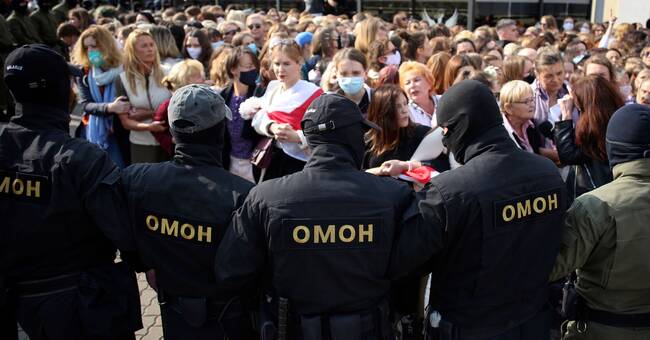"He is like a freight wagon that has come loose from the locomotive and remained on the rails long after the train has left."
This is what a 24-year-old protester Lukashenko described to me recently.
He grew up under Lukashenko's regime and has never experienced anything other than dictatorship, but he has not had to worry so much about the political situation until now.
He, like many others I spoke to, suddenly got enough when the presidential administration did not even bother to try to hide the electoral fraud.
By then, he had already neglected to try to protect his population from the coronavirus by first denying its existence and then joking away the deadly virus by saying that it only takes a little vodka and sauna to stay healthy.
The citizens not only felt abandoned but also declared idiots.
They realized that they only had each other, and took to the streets in an unprecedented community.
The big neighbor stepped on stage
After a few violent days shortly after the election, the dictator seemed to lose his grip.
Police in riot gear stormed a rally on Friday, removing hundreds of protesters by truck.
Lukashenko's days seemed to be numbered.
But then the big neighbor stepped onto the stage.
Or rather behind the scenes as a competent prompter.
According to Belarusian media, about a hundred journalists, funded from the Russian state budget, are now taking over the state-owned Belarusian TV channels in Minsk.
Russia Today itself states that they have 32 journalists in Minsk, and another gang works for Sputnik.
They are professionals in their field, they know how to produce stylish, easily accessible and convincing propaganda.
They are dusted by concepts and phrases that they use during the Euromajdan in Ukraine, they know that the very words they choose evoke associations about war, chaos and death.
They go out and film addicts, the homeless and the mentally ill in a way that is ethically unacceptable and then portray them as opposition protesters, paid by the West to create chaos and bloodshed.
Know no boundaries
Some of the rhetoric is the same as Lukashenko's old common propaganda, but the form is so much more convincing.
Belarusian journalists employed by state television have either voluntarily left or are no longer allowed in, despite the fact that the access cards are fully functional.
Their desks have been taken over, their awards taken down and those who defy their bosses and comment on the situation arrested, threatened or sentenced to prison.
Several have fled the country, others are hiding in the countryside.
A desperate dictator knows no bounds.
Retaining power may cost whatever it wants.
Mr Lukashenko has shown that he is even prepared to give up his words of praise for independence and sovereignty.
The interview with Lukashenko the other day, where he said that he had been in power for a long time, was well directed and the words were hardly his own.
It was a given that this would be picked up by Western media.
Everyone stopped listening and missed that he then said that he will definitely not resign.
On Monday, he will meet with Russian President Vladimir Putin in Sochi.
It has already been made clear that there will be no press conferences or joint statements afterwards.
Either both sides are aware that they may not really agree as much as you want it to look, or it is clear that only one person will be responsible for communication with the outside world.
When the actor has lost his lines, everything depends on the prompter.
The question now is how the spectators will react.
A Belarusian former TV journalist asked me rhetorically "EU politicians repeat that they are worried about the situation in Belarus, maybe it's time to at least start saying that they are very worried about the situation in Belarus?"

